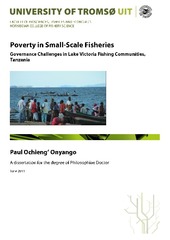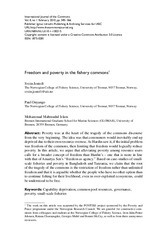| dc.contributor.advisor | Jentoft, Svein | |
| dc.contributor.author | Onyango, Paul Ochieng | |
| dc.date.accessioned | 2011-08-15T08:44:06Z | |
| dc.date.available | 2011-08-15T08:44:06Z | |
| dc.date.issued | 2011-08-23 | |
| dc.description.abstract | The pursuit of a world without poverty is without doubt among the leading global challenges not only for governments but also the poor themselves. This challenge is also in small-scale fishing communities where poverty is persistent and has become a thorny issue to the poor as well as governing actors. Strategies have been formulated and implemented but the results have not been up to the expectations. Why haven’t these strategies yielded expected results? This is the central question of this thesis.
This study seeks to understand why poverty persists despite the good instruments that have been directed at its alleviation. It examines poverty through studying the underlying factors that determine relationships between and among the many variables that make poverty a multidimensional problem. It argues that the persistent poverty in small-scale fishing communities in Lake Victoria Tanzania finds explanation in the manner in which poverty and its challenges have been understood and addressed.
By using Kooiman’s and Jentoft’s (2009) ‘meta-governance’ perspective, the study discusses how differences in, what people consider as important (values), what they believe is morally mandatory to do (norms) and what should direct behaviour or action (principles), explain the persistent poverty in fishing communities. The study shows that there is inconsistency in the way poor fishers’, riparian to the Lake and governing actors in Tanzania understand poverty in the fishing communities and how to confront it. This inconsistency exists at the meta-governance level i.e. with regards to values, norms and principles. The study proposes that to alleviate poverty, a solution to this difference should be sought from a governance mechanism that addresses the dissimilarity. This must be a process which provides governing actors and the poor opportunities to interact in order to influence policy. | en |
| dc.description.doctoraltype | ph.d. | en |
| dc.description.popularabstract | The pursuit of a world without poverty is without doubt among the leading global challenges not only for governments but also the poor themselves. This challenge is also in small-scale fishing communities where poverty is persistent and has become a thorny issue to the poor as well as governing actors. Strategies have been formulated and implemented but the results have not been up to the expectations. Why haven’t these strategies yielded expected results? This is the central question of this thesis.
This study seeks to understand why poverty persists despite the good instruments that have been directed at its alleviation. It examines poverty through studying the underlying factors that determine relationships between and among the many variables that make poverty a multidimensional problem. It argues that the persistent poverty in small-scale fishing communities in Lake Victoria Tanzania finds explanation in the manner in which poverty and its challenges have been understood and addressed.
By using Kooiman’s and Jentoft’s (2009) ‘meta-governance’ perspective, the study discusses how differences in, what people consider as important (values), what they believe is morally mandatory to do (norms) and what should direct behaviour or action (principles), explain the persistent poverty in fishing communities. The study shows that there is inconsistency in the way poor fishers’, riparian to the Lake and governing actors in Tanzania understand poverty in the fishing communities and how to confront it. This inconsistency exists at the meta-governance level i.e. with regards to values, norms and principles. The study proposes that to alleviate poverty, a solution to this difference should be sought from a governance mechanism that addresses the dissimilarity. This must be a process which provides governing actors and the poor opportunities to interact in order to influence policy. | en |
| dc.description.sponsorship | Norwegian Research Council
University of Tromsø | en |
| dc.description | Papers 1,3,4 and 5 of the thesis are not available in Munin: <br/>1. Onyango, P. O.: 'Re-configuring Poverty: The Wickedness Perspective', African Journal of Tropical Hydrobiology and Fisheries (2009), 12, 37-46. Available at <a href=http://www.ajol.info/index.php/ajthf/article/view/58032>http://www.ajol.info/index.php/ajthf/article/view/58032</a> <br/>3. Onyango, P. O. and S. Jentoft: 'Assessing poverty in small-scale
fisheries in Lake Victoria, Tanzania', Fish and Fisheries (2010), 11, 250-263. Available at <a href=http://dx.doi.org/10.1111/j.1467-2979.2010.00378.x>http://dx.doi.org/10.1111/j.1467-2979.2010.00378.x</a> <br/>4. Onyango, P. O.: 'Occupation of last resort? Small-scale fishing in Lake Victoria, Tanzania', In Jentoft S. and A. Eide (Eds.). Poverty Mosaics: Realities and Prospects in Small-Scale Fisheries (2011) Springer Verlag. Available at <a href=http://dx.doi.org/10.1007/978-94-007-1582-0_6>http://dx.doi.org/10.1007/978-94-007-1582-0_6</a> <br/>5. Onyango, P. O. and S. Jentoft.: 'Climbing the Hill: Poverty Alleviation, Gender Relationships, and Women’s Social Entrepreneurship in Lake Victoria, Tanzania' (accepted paper in Maritime studies) | en |
| dc.identifier.isbn | 9788282660143 | |
| dc.identifier.uri | https://hdl.handle.net/10037/3551 | |
| dc.identifier.urn | URN:NBN:no-uit_munin_3272 | |
| dc.language.iso | eng | en |
| dc.rights.accessRights | openAccess | |
| dc.rights.holder | Copyright 2011 The Author(s) | |
| dc.rights.uri | https://creativecommons.org/licenses/by-nc-sa/3.0 | en_US |
| dc.rights | Attribution-NonCommercial-ShareAlike 3.0 Unported (CC BY-NC-SA 3.0) | en_US |
| dc.subject | VDP::Social science: 200::Social anthropology: 250 | en |
| dc.subject | VDP::Samfunnsvitenskap: 200::Sosialantropologi: 250 | en |
| dc.title | Poverty in Small-Scale Fisheries :
Governance Challenges in Lake Victoria Fishing Communities, Tanzania | en |
| dc.type | Doctoral thesis | en |
| dc.type | Doktorgradsavhandling | en |


 English
English norsk
norsk

